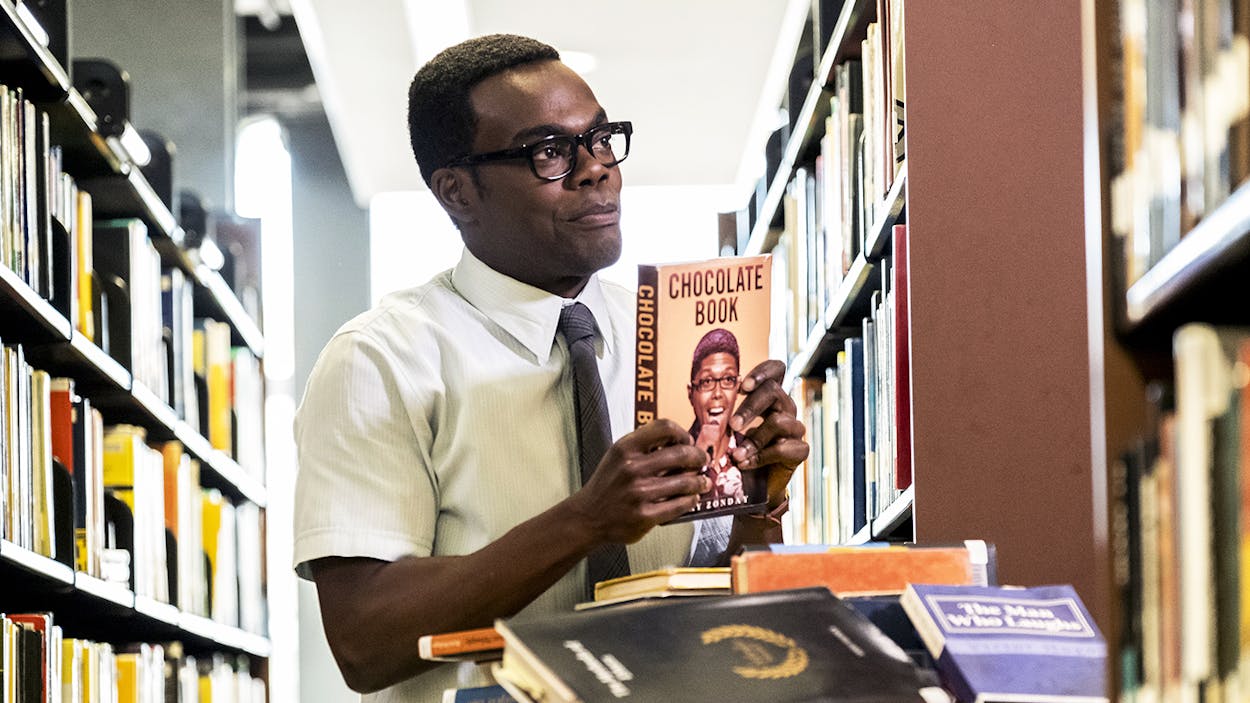William Jackson Harper’s success on the small screen was a long time coming. The Oak Cliff native cut his teeth performing in plays in his hometown after college, then spent almost a decade in New York City, where he scored parts in off-Broadway productions and in local television shows (here he is on The Electric Company, as a cowboy/apple rap battling with a hot dog/Lin Manuel-Miranda). Now, thanks to his breakout role in NBC’s hit comedy The Good Place, he’s a familiar face nationwide.
Harper plays the perennially panicked philosophy professor Chidi Anagonye, starring alongside Ted Danson and Kristen Bell. For the uninitiated, the critically adored show’s premise is hard to summarize. But let’s just say it’s a half-hour comedy from the creator of Parks and Recreation that takes place in heaven. Kind of. And also, it’s forking awesome.
Ahead of the season three finale of The Good Place, which airs Thursday night, we spoke with Harper about playing Chidi, Dallas during the civil rights movement, and teaching Ted Danson to floss.
Texas Monthly: When you got the part of Chidi, you were largely unfamiliar with the premise of The Good Place. What exactly did you know about it?
William Jackson Harper: I honestly knew nothing. In the script that they gave in the audition, I was reading as a lawyer with the Innocence Project working with a woman named Eleanor, who was at this conference with me. Throughout the course of the scenes we find out that she’s actually not working with the Innocence Project, and she just wanted to hang out with me for a little bit. She didn’t want to tell me that she wasn’t actually working with them. I was like, “I have no idea what how this show works, but OK.” I just sort of went with it. And then after I got the part creator Mike Schur called me and said, “That part you read, that is not the show. When you come into the office that will tell you exactly who you’re playing and what the premise of the show is.” I went to the office and they told me. I thought, “Oh. Whoa. Okay. That is not at all what I was expecting.”
TM: Chidi has a very defined personality. You can see the tension in your neck and shoulders with every line. How much of that is from very specific instructions on the page and how much of that is just you?
WJH: Our writers are big-fat-brain geniuses, and so a lot of stuff is just laid on the page. I mean the physicality, that’s more just me being a very nervous dude. They write some physicality, but a lot of it is up to interpretation, especially since we don’t really improvise that much on the show because of the narrative.
TM: There’s a viral video of you teaching Ted Danson how to floss, and in the twelfth episode of this season, Michael flosses. Was that something that you were teaching him for fun that they then wrote into the story once the world saw how much it needed to see Ted Danson floss?
WJH: It was already in the script. He actually was just like, “Oh, God. I have to learn how to floss.” So in between takes we would just work on it. And work on it. And work on it. And he got it!
https://twitter.com/harleivy/status/1063258248931930113?ref_src=twsrc%5Etfw%7Ctwcamp%5Etweetembed%7Ctwterm%5E1063258248931930113&ref_url=https%3A%2F%2Fnerdist.com%2Fted-danson-learning-to-dance-floss-the-good-place%2F
TM: You’ve had a busy year. You’ve got two movies coming out—Midsommar, which comes out in August, and Lost Holiday, which premieres in just a few days. You’ve also got a project with Todd Haynes and another TV show, Tom Clancy’s Jack Ryan, in the works. That’s a lot to squeeze in before you start shooting season four of The Good Place.
WJH: Well, we don’t start filming season four for a little over a month at this point. So right now I’m just sort of trying to gobble up as much work as I can. It helps to stay fresh and nimble. If I sit for too long it’s harder for me to really get into the swing of things by the time we’re supposed to start shooting again.
TM: You wrote a play that premiered last year, Travisville, that was set in Texas during the civil rights movement. The New York Times mentioned that some of the white characters thought of themselves not like those “rednecks in Alabama and Mississippi,” and I wondered if that is a distinctly Texan thing, since Texas has been able to distance itself somewhat from the deep South.
WJH: I feel like that Texas, and Dallas in particular, has sort of escaped the stigma that comes with being a Southern city in a lot of ways. Not all of it, but some. The play was inspired by this book, The Accommodation, by Jim Schutze, which is about the sort of handshake agreement between white civic and business leaders and black ministers to keep the tumult of the civil rights movement from coming into Dallas. The book really focuses on this plan to remove black residents from around the Fair Park area to make room for a parking lot. For the play, I didn’t really want to just write down that exact story, but the voices of the business leaders, the civic leaders, the ministers are very interesting and nuanced. It was clear that there was a lot of go-along-to-get-along politics. In a way it felt like there was a sort of ersatz progressivism that Dallas was very much a part of. I wanted to unpack what that actually meant, the resentment that’s left in its place when someone is asked to forgo certain freedoms and endure affronts to their humanity in exchange for the economic progress of an entire city. I thought that was really interesting. It got my brain working.
TM: Had you always wanted to write a play or did the book really bring it out of you?
WJH: It started when I asked mom about the civil rights movement in Dallas and she said that nothing really happened here. That seemed odd, and it’s always been in the back of my mind. Why is it that nothing happened? Then I found that book and it really kicked things off. I tried to write things before but none of them were very good. I didn’t want to show anything to anybody. This was the first time that my brain really took over, and I really wanted to see where it went. I was inspired and really excited to see what was going to happen to these characters.
TM: What was it like watching D’Arcy Carden play Chidi in the “Janet(s)” episode of The Good Place? That was one of the best episodes of television I’ve ever seen.
WJH: It’s an incredible episode of TV. D’Arcy is a genius. We all rehearsed with her doing our parts, and she recorded a read-through so she could hear our rhythms and our cadences and stuff like that. Watching her do it, she’s been around us for so long that she just got us. Watching her play me, there were some moments when I was like “Man, I should just do it the way she does it.” It was incredible to watch. But it was also one of those moments where I thought that I didn’t want her job, because it’s really hard.
TM: Here’s a question, sort of for our readers, but mostly for me: are Ted Danson’s hugs as good as I imagine they would be?
WJH: Yeah, they are. He’s all love, so his hugs are very real, I-mean-it kind of hugs.
TM: The Good Place seems like it has a cast of people who get along and care about one another, which I think is part of what makes it such a fun show to watch.
WJH: We live in a world where everyone’s just highlighting differences all the time. It’s kind of fun to see people with a lot of differences kind of hunkering down and trying to work for each other, and live for each other, and look out for each other.
TM: Anything you can tell us about season three finale or season four?
WJH: The finale is super special to me. I’m really excited for people to watch it, and I want people to have no idea of anything that is going to happen going in. As far as season four goes, we have no idea. We are reading those scripts week by week as we’re shooting the show, so we’re sort of taking the same ride as the audience. “What’s going to happen next week? What’s going to happen in this episode?” We’re all in the same boat on that front.
This interview has been edited for clarity and length.
- More About:
- Film & TV
- Television
- Dallas








